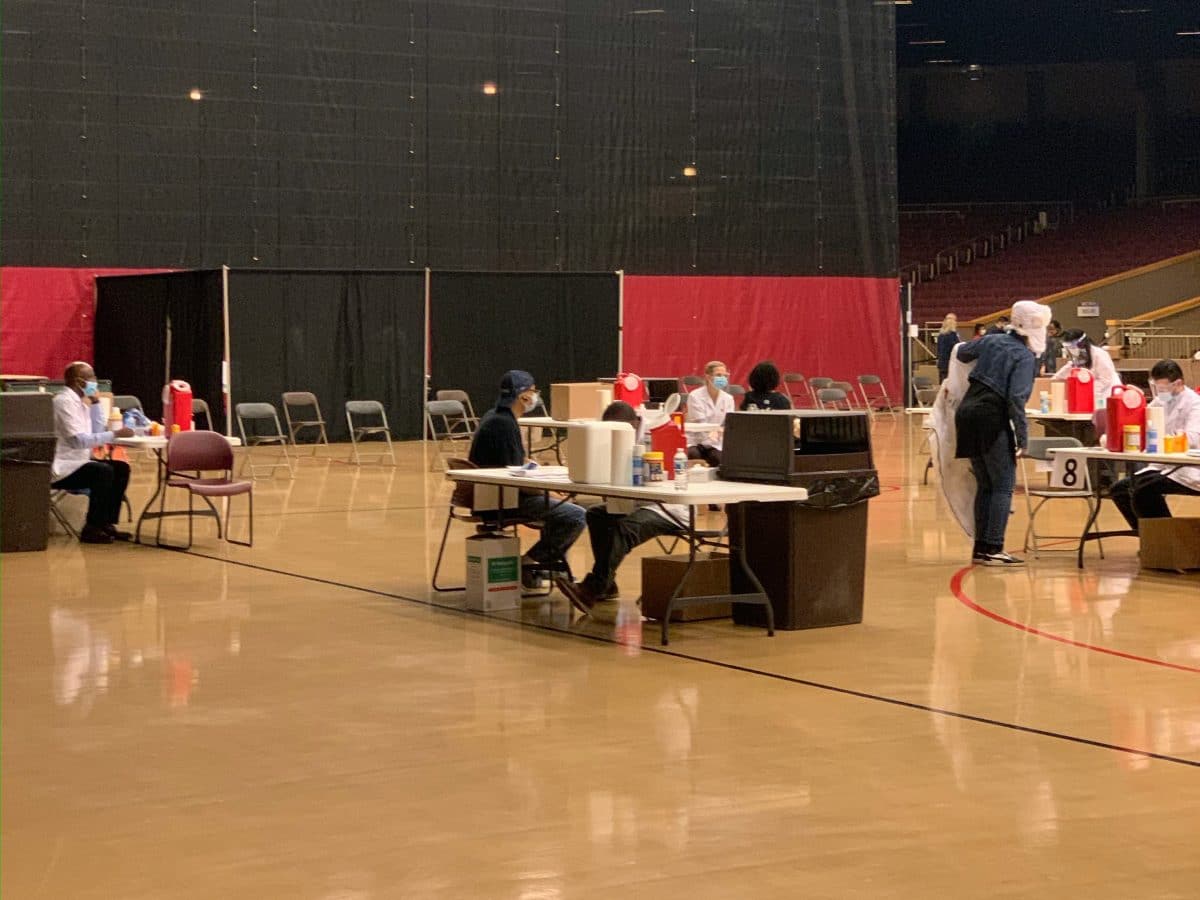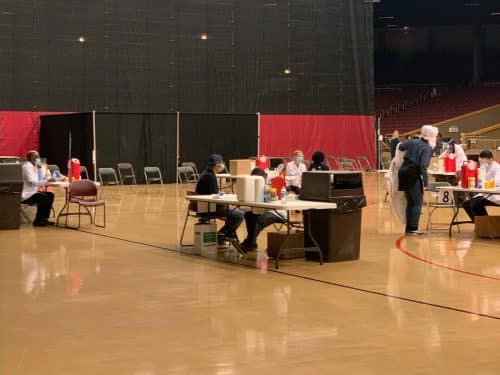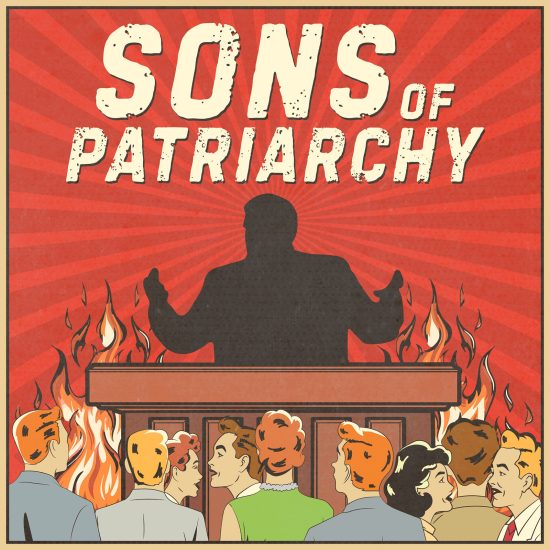
CHICAGO (RNS) — Pastors and other church leaders have learned a host of lessons during the COVID-19 pandemic: how to stream video, preach to a crowd whose faces are masked, and take drive-in confessions.
Many have also learned a new commandment. Thou shalt not talk about vaccines.
Fewer than half of churchgoers say their clergy (44%) have spoken about vaccines, according to a survey by Pew Research. That includes just over a third (39%) who have encouraged people to get vaccines and a small number (5%) who have discouraged people from doing so. Those numbers drop for evangelical clergy, with 21% encouraging vaccines and 4% discouraging them.

A vaccination event organized by Salem Baptist Church in Chicago, Illinois. (Religion News Service)
One exception: historically Black churches, where two-thirds of churchgoers say pastors have encouraged their people to get vaccines. And some have even led their churches to set up on-site vaccine clinics.
A pastor and a physician, Bishop Horace Smith of Apostolic Faith Church in Chicago’s Bronzeville neighborhood, a prominent, predominantly Black congregation, feels an obligation to care for his people, physically and spiritually.
Early in the pandemic, Smith knew that vaccines would play an essential role in fighting COVID-19. Without vaccines, the toll from the disease could become astronomical, said Smith, an attending physician specializing in pediatric hematology and oncology at Ann & Robert H. Lurie Children’s Hospital of Chicago.
“There is no modality in medicine that has saved more lives and prevented more diseases than vaccines,” he said.
Smith said officials made some mistakes early on early when it came to COVID-19 vaccines. For example, he said, naming the vaccine initiative “Operation Warp Speed” was unfortunate.
“I think that threw some people off, because people think you are cutting corners,” he said.
Smith said he began talking to his congregation about vaccines before they were available. He worked with other local pastors to encourage church members to sign up for vaccine trials, knowing that those trials would help researchers know if the vaccines were effective for different ethnic groups. That was especially important, he said, given how hard COVID-19 hit communities of color.
Smith also worked hard to reassure people that vaccines were trustworthy. Just telling people they should get vaccinated was not enough, he said.
“I always tell people that medicine, like pastoring, is a matter of trust,” he said.
When the vaccines became widely available in early 2021, the church worked with health care partners to offer the shots. So far, his network has helped vaccinate more than 6,000 people and recently began offering pediatric vaccines at the church. Smith also went on local television when he got his first vaccine, to send a message that vaccines are trustworthy. He pointed to recent statistics about COVID-19 deaths to make a point about how effective vaccines are, pointing out that the vast majority of COVID-19 deaths are now among those who are not vaccinated.
Smith said he has spent time talking with other pastors about vaccines, including with those who are skeptical about them — talking about the science to some, about the Bible to others.
For some Christians, he said, skepticism has been rooted in ideas from the Book of Revelation about the so-called mark of the beast, found in Revelation 13. “If you look at the Scripture,” he said, “the vaccine cannot be the mark of the beast. It does not fit any of the scriptural references.”
People who have died during COVID-19 didn’t die because they lacked faith, said Smith. They often died, especially early on, because doctors and church leaders didn’t have the knowledge needed to combat COVID-19. He sees the development of vaccines as a gift from God — giving people the knowledge and the tools needed to fight the virus.
“If you have faith,” he said, “then thank the doctors and scientists for their work. And give glory to God because all knowledge comes from God.”
There’s no comprehensive national data on how many congregations have served as vaccination sites. But Marcus Coleman, director of the Department of Homeland Security’s Center for Faith-Based and Neighborhood Partnerships, said faith-based and community groups have worked with the Federal Emergency Management Agency to facilitate about 300,000 vaccinations.
Coleman pointed to church leaders such as Bishop T.D. Jakes of the Potter’s House, the Rev. Gabriel Salguero of the National Latino Evangelical Coalition and the Rev. Walter Kim of the National Association of Evangelicals — as well as to conversations led by former Obama faith adviser Joshua DuBois — as helping people have “necessary conversations” about vaccines. Faith leaders, Coleman said, can help people talk through the importance of vaccines but also can listen to people’s concerns.
Talking about vaccines isn’t only important for the congregation itself. The ZIP code around Salem Baptist Church, about 10 miles south of Apostolic Faith Church, has been hit hard by the virus. Salem’s senior pastor, James Meeks, has been outspoken about vaccinations and about taking action to keep people safe during COVID-19. Denise Rogers, chief operating officer for Salem, said Meeks has also seen the toll that COVID-19 has taken on the community.
“He has done so many funerals this year from COVID-related deaths,” she said.
Salem, one of the largest congregations in Chicago, has made giving vaccines a regular part of its ministry to the community. The church has helped vaccinate more than 5,000 people, said Rogers, and has distributed more than 140,000 masks and 15,000 meals. Currently meeting for in-person worship two Sundays a month, it provides vaccinations during services and other church events.
“We try to do them every time the doors are open,” said Rogers.
Rogers has worked with Walgreens and with local health clinics to provide vaccines. She said Salem will work with any medical professionals willing to work on Sundays. Churches, she said, can be an important partner in addressing public health, especially in the Black community, because they are seen as trusted institutions.
They are also important gathering places, both for older members as well as their children and grandchildren, said Rogers. He hopes there will be more collaboration between churches and public health officials in the future.
“We have the people here, so come to the people,” she said.
Shaun Marshall, pastor of ministries at Salem, said that caring for people’s health — physically, emotionally, and spiritually — is part of the core mission of the church and essentially biblical teaching. Facilitating vaccines, he said, is a way to help give people hope during a difficult time.
“I realize that people may have very different views and even strongly held opinions on the vaccine,” he said. “However, if there is a way for us to help people have the hope of not losing their lives or their loved ones to a virus we know has proven deadly, I think that the church should offer it, along with any other support we can to help people recover and communities to flourish.”






